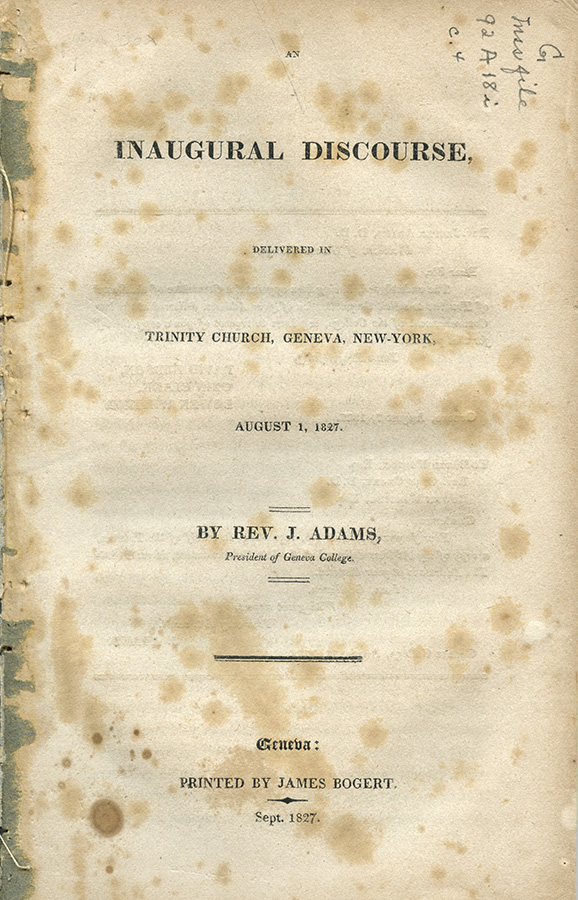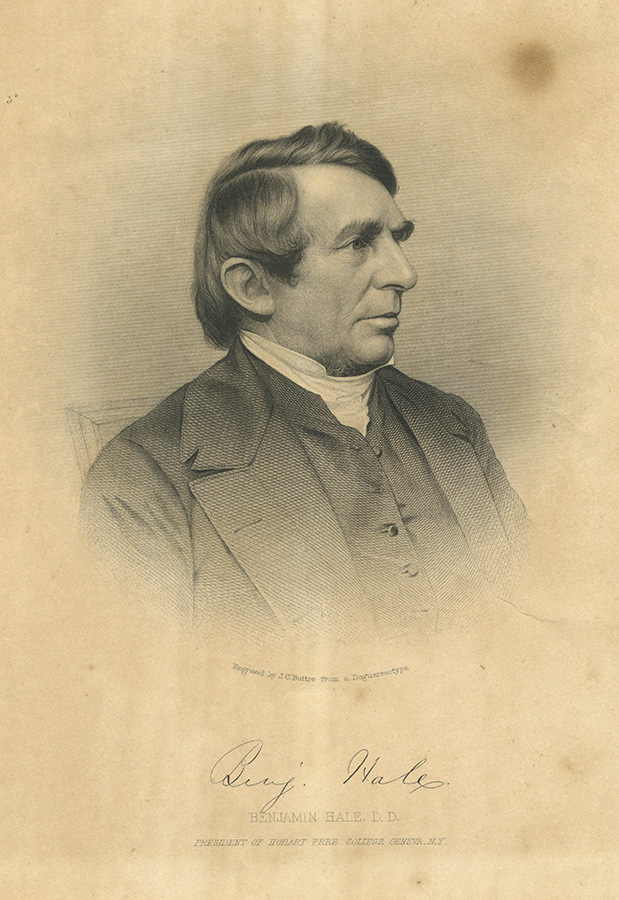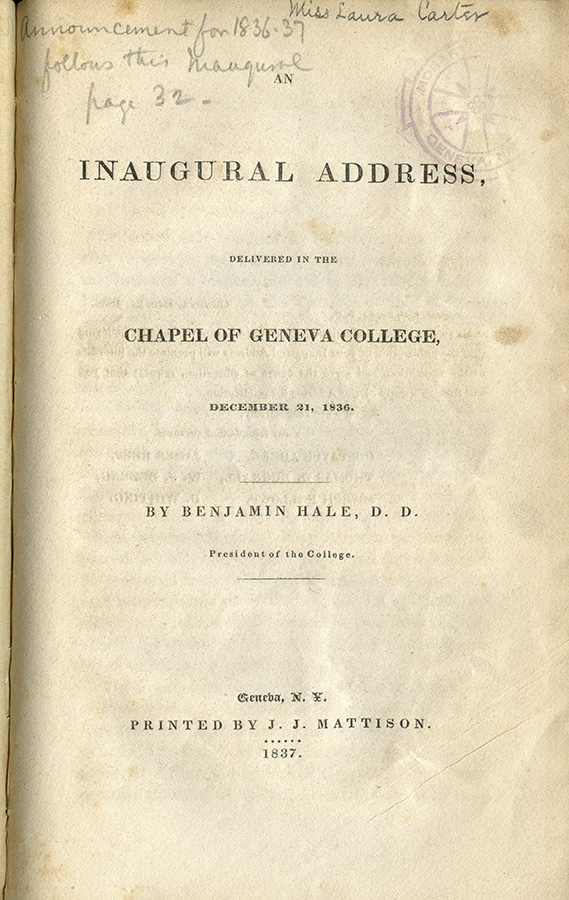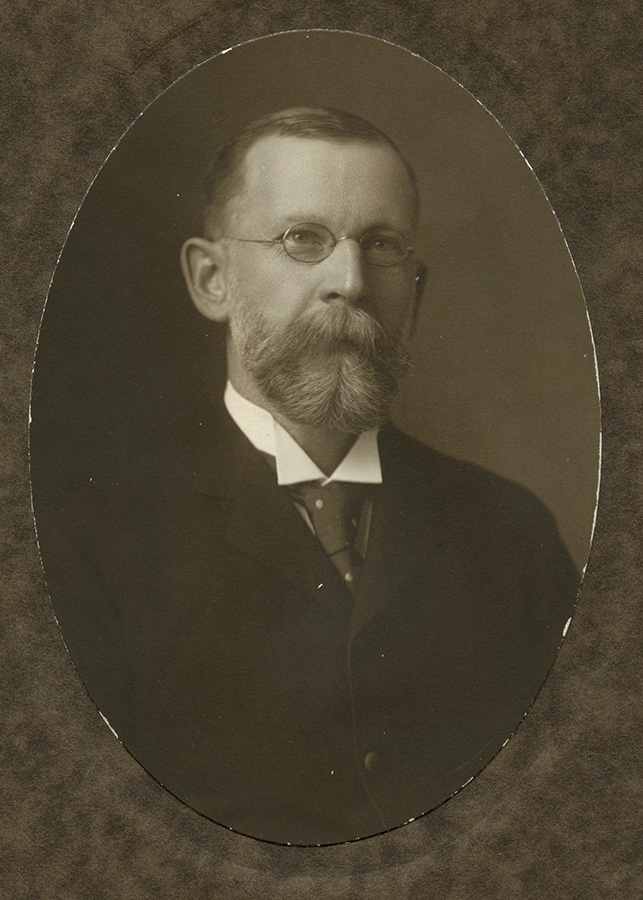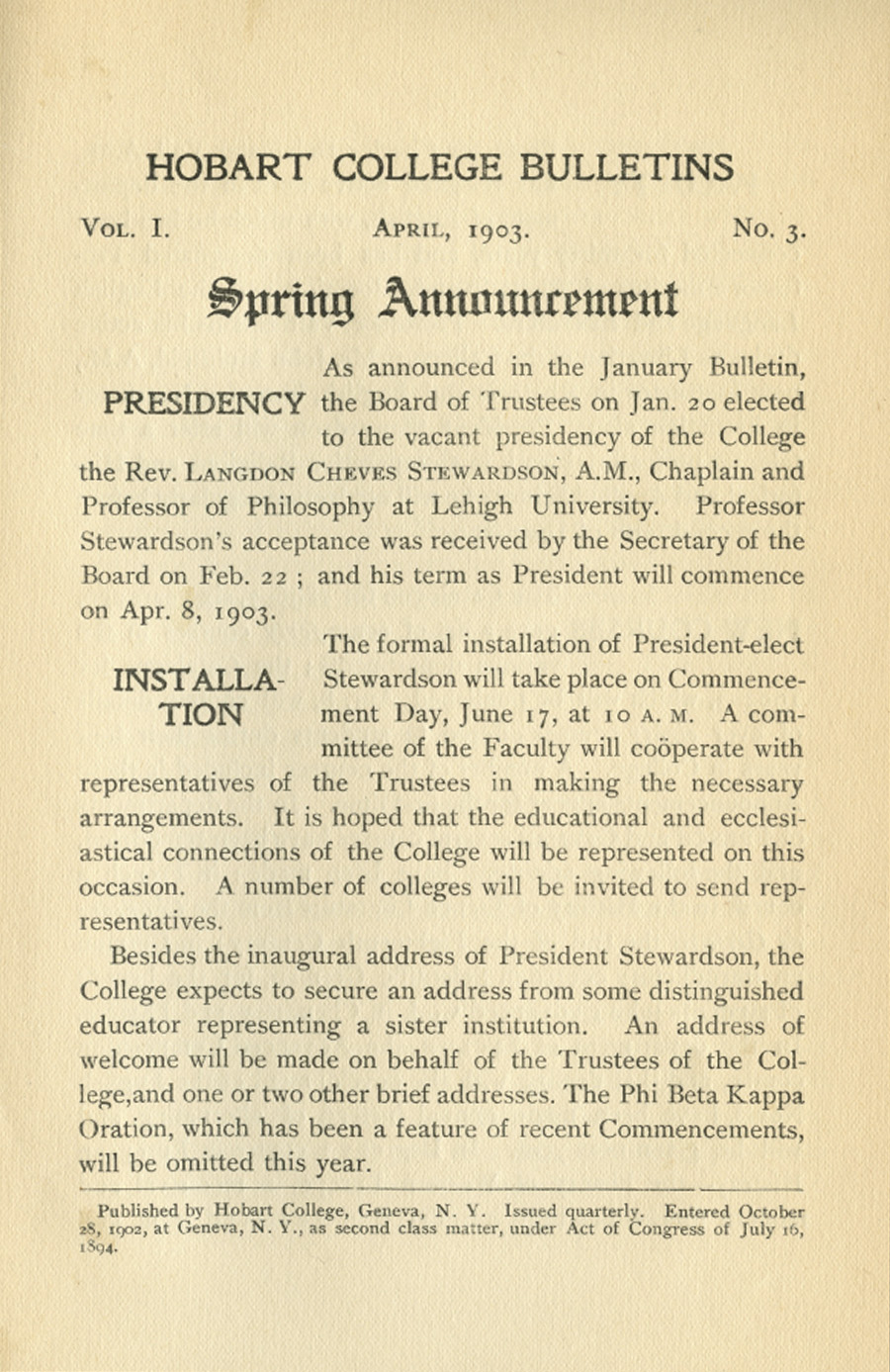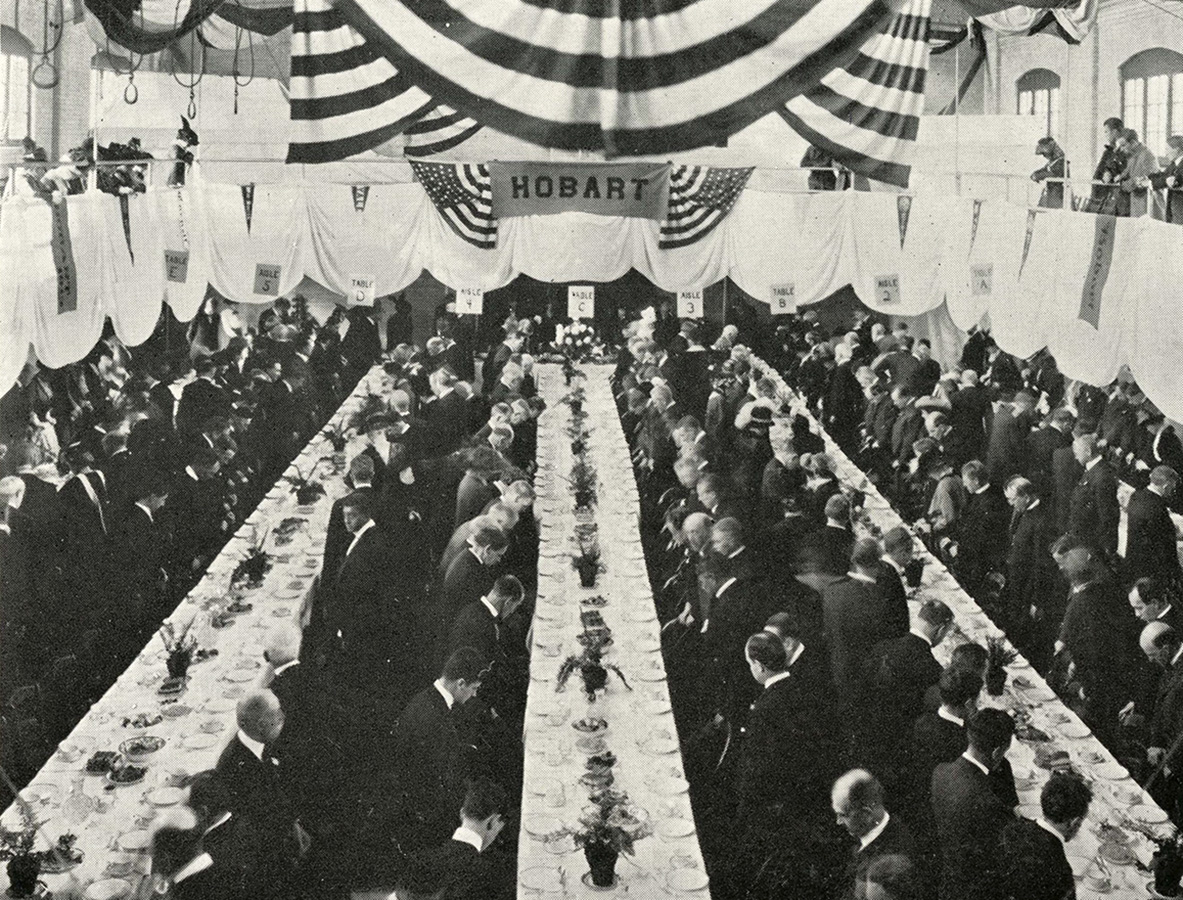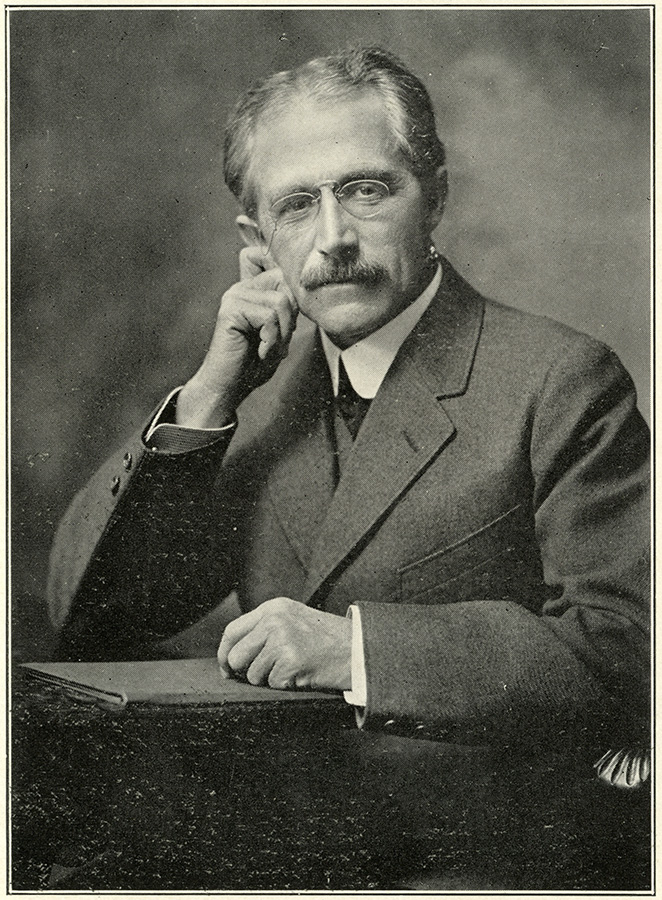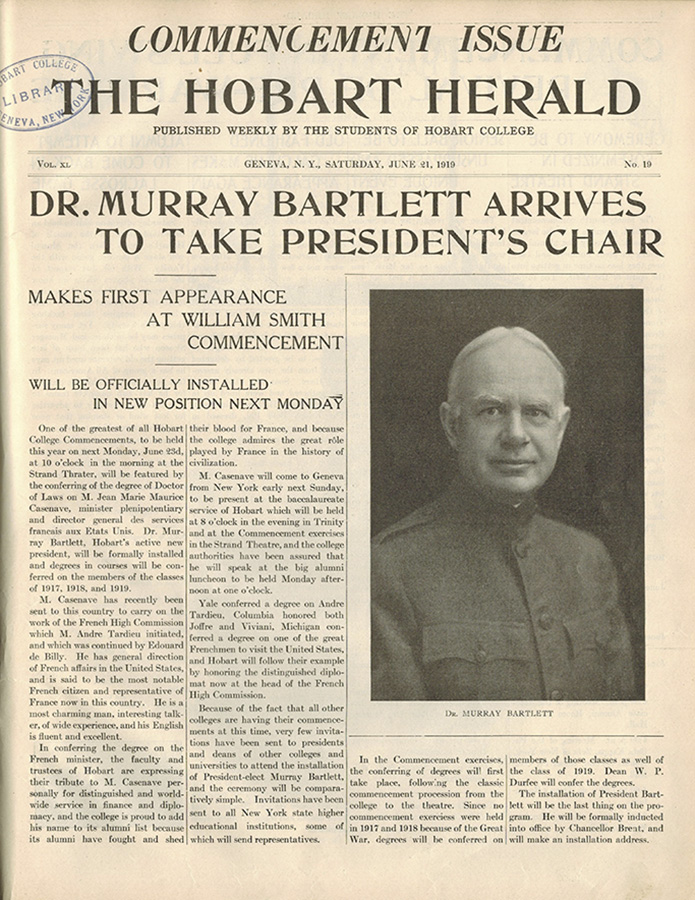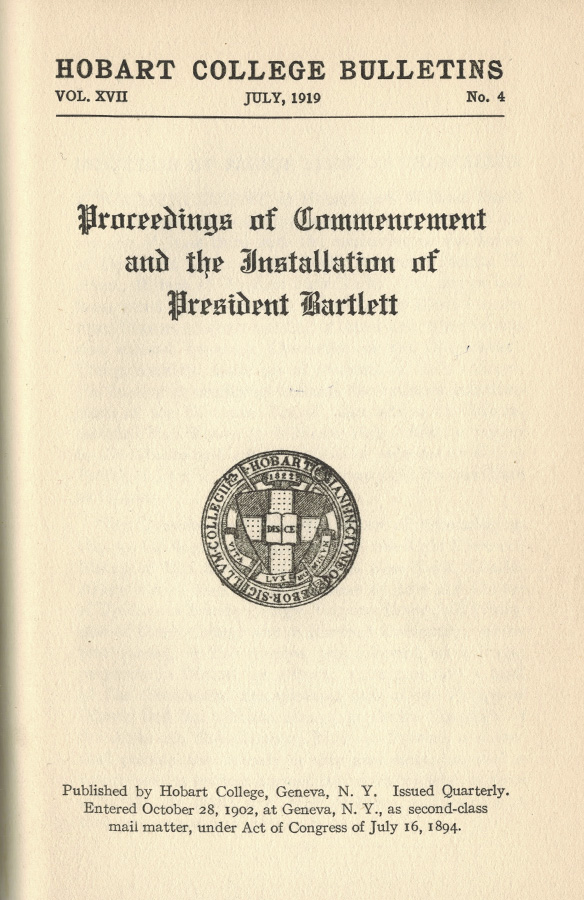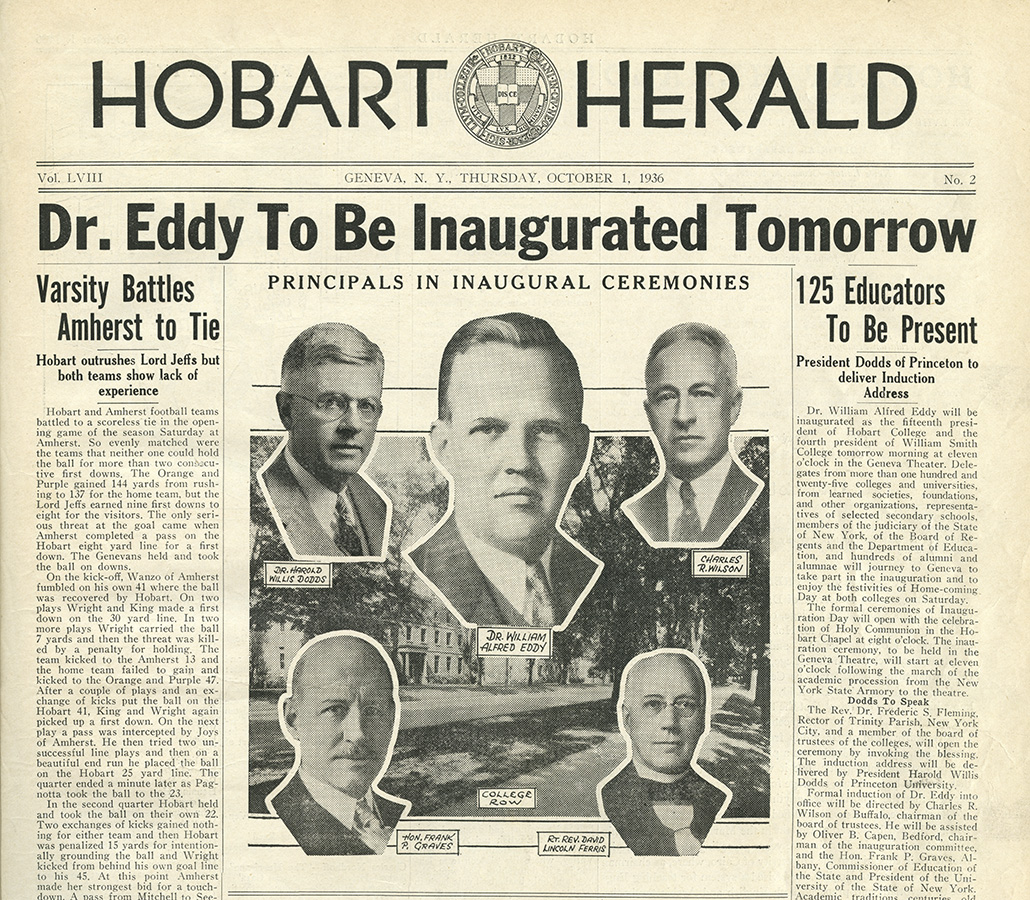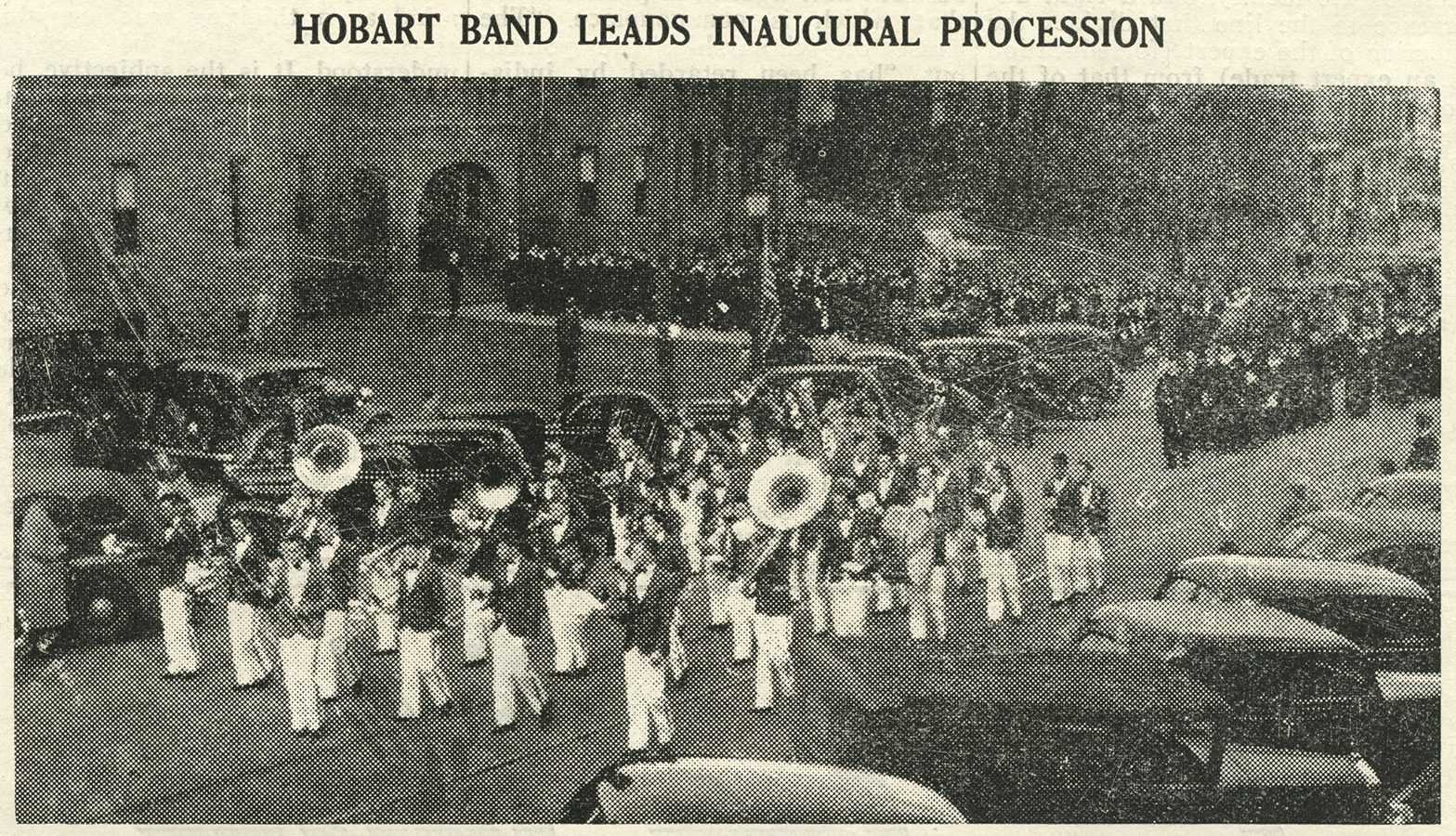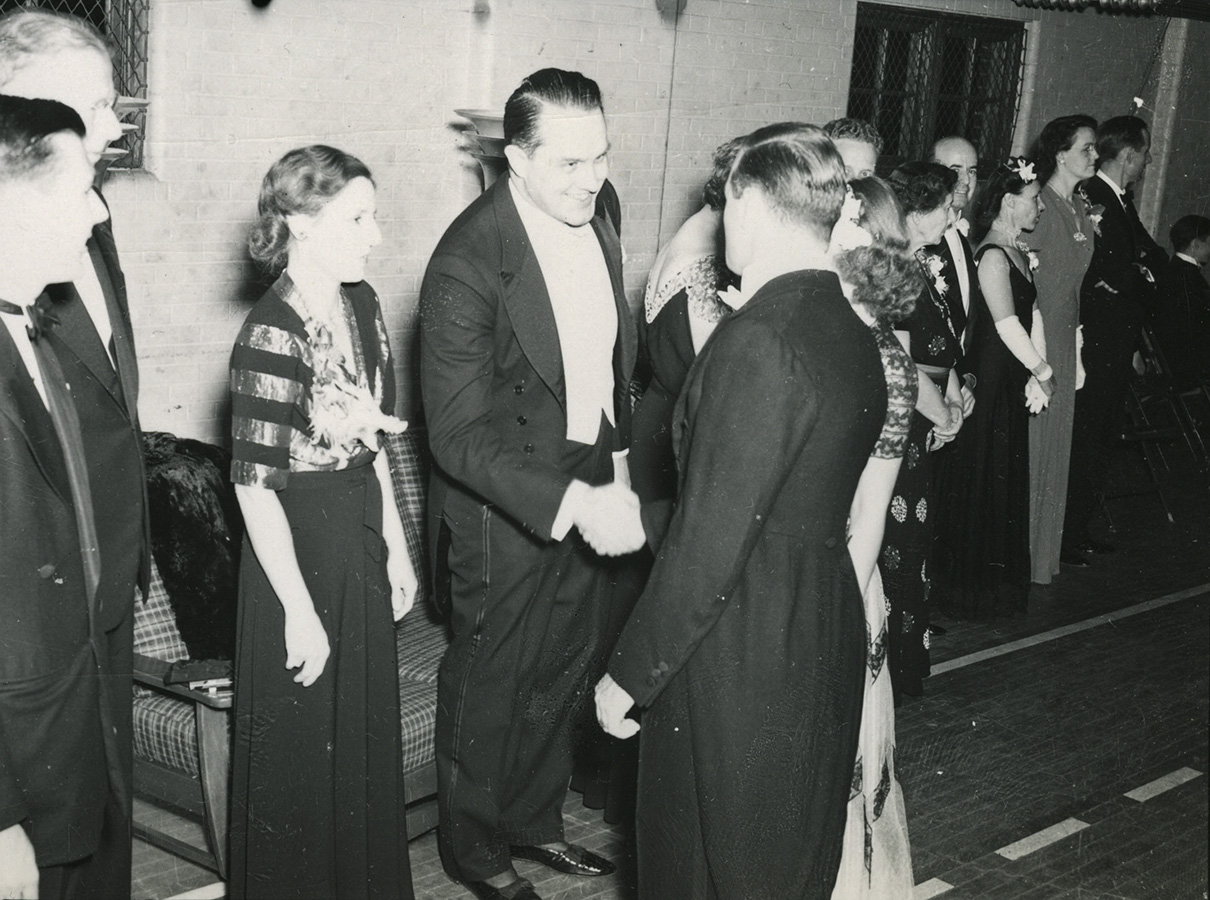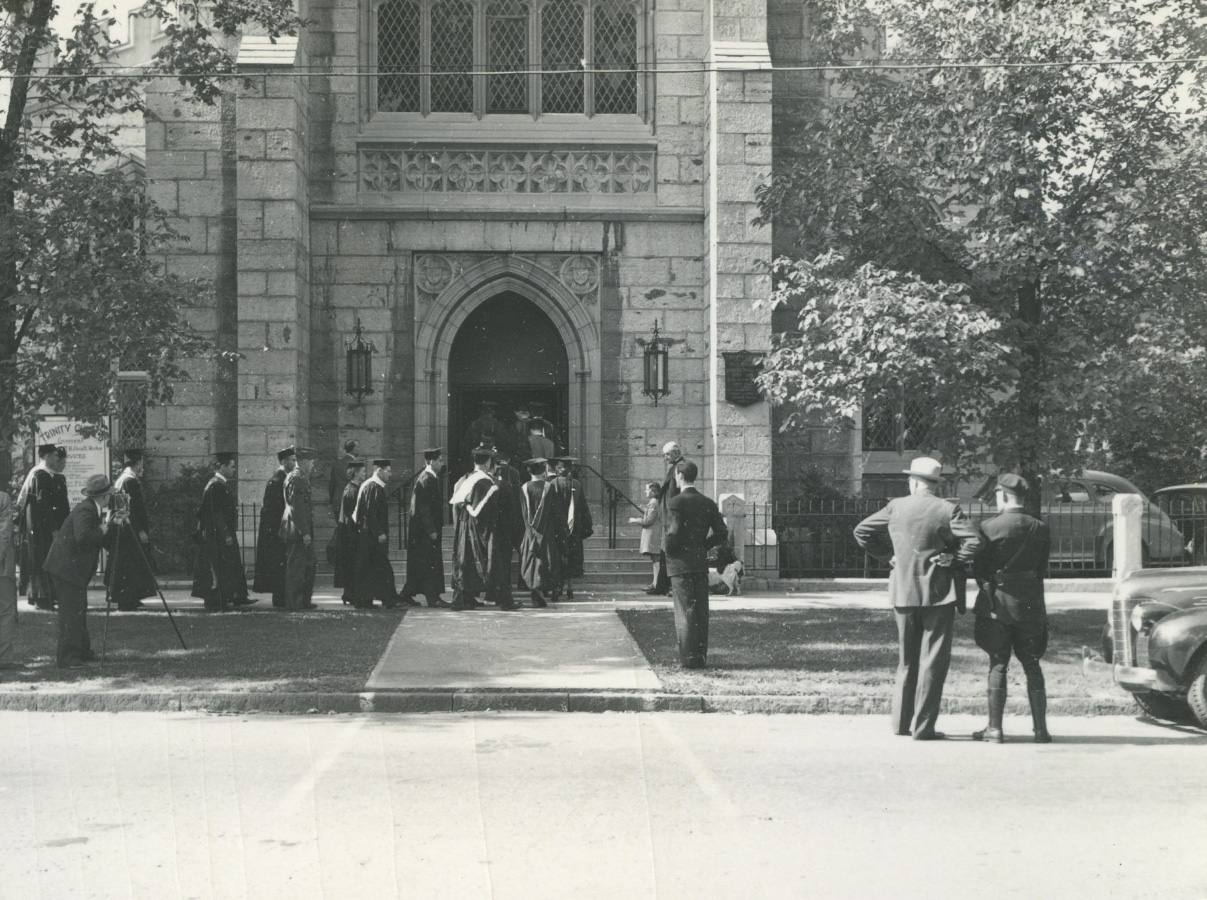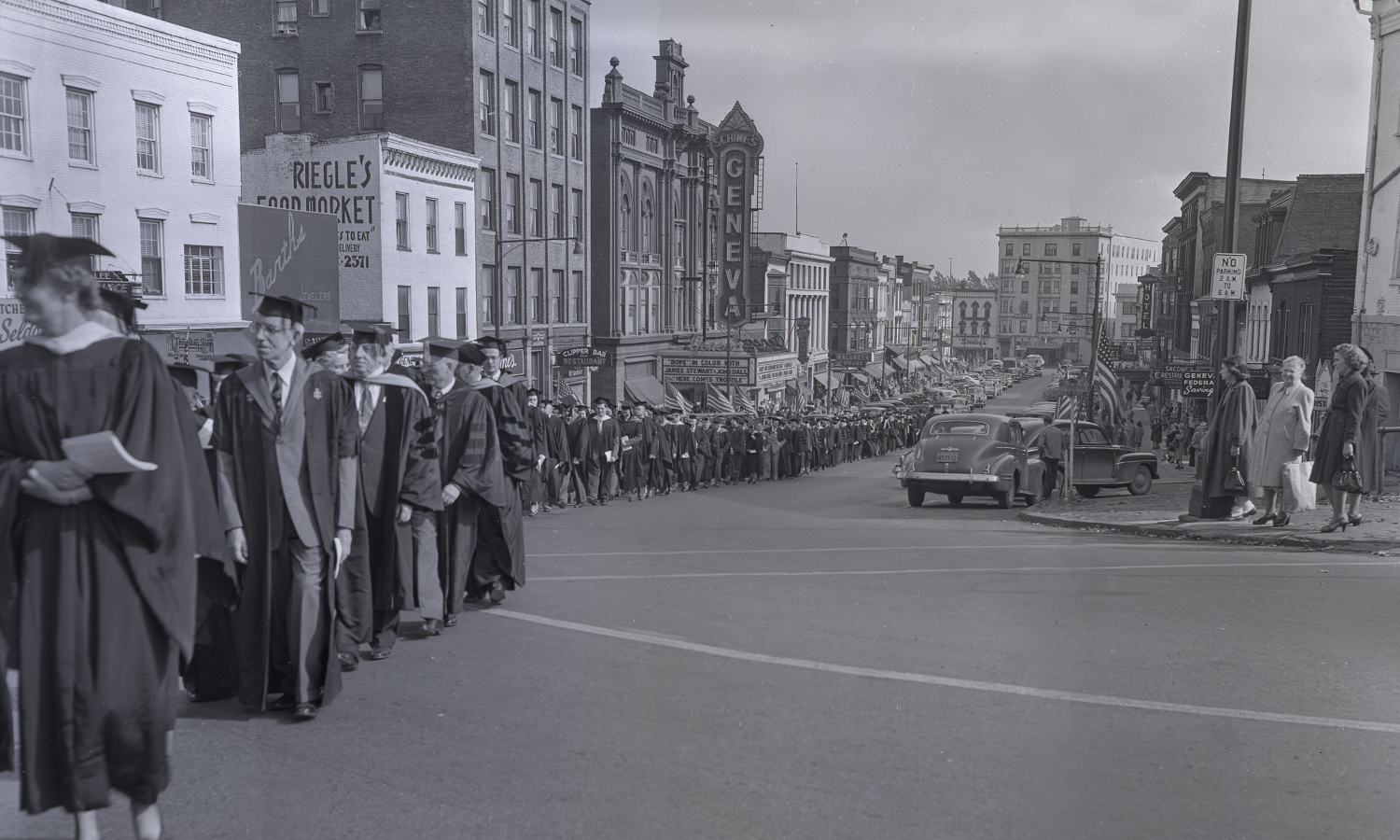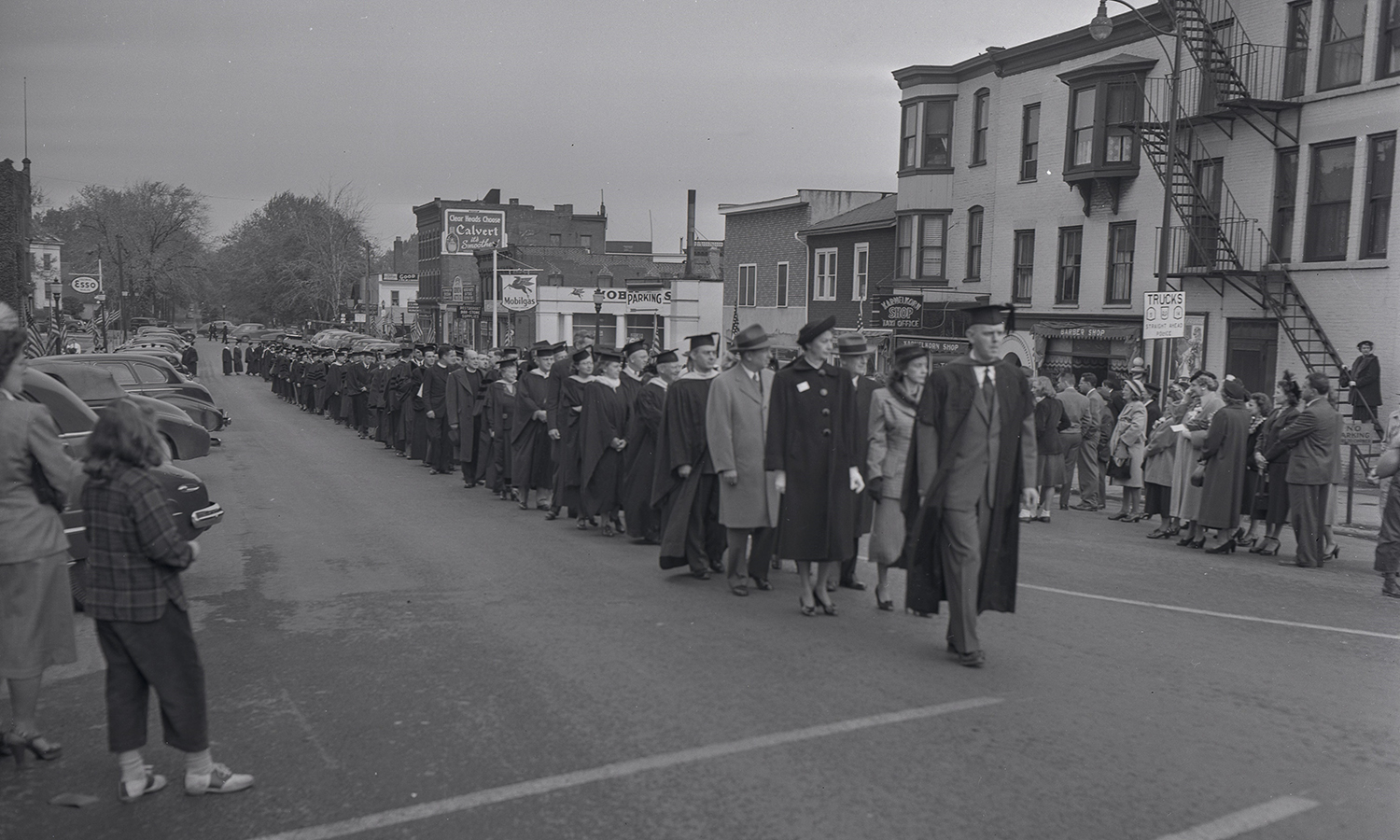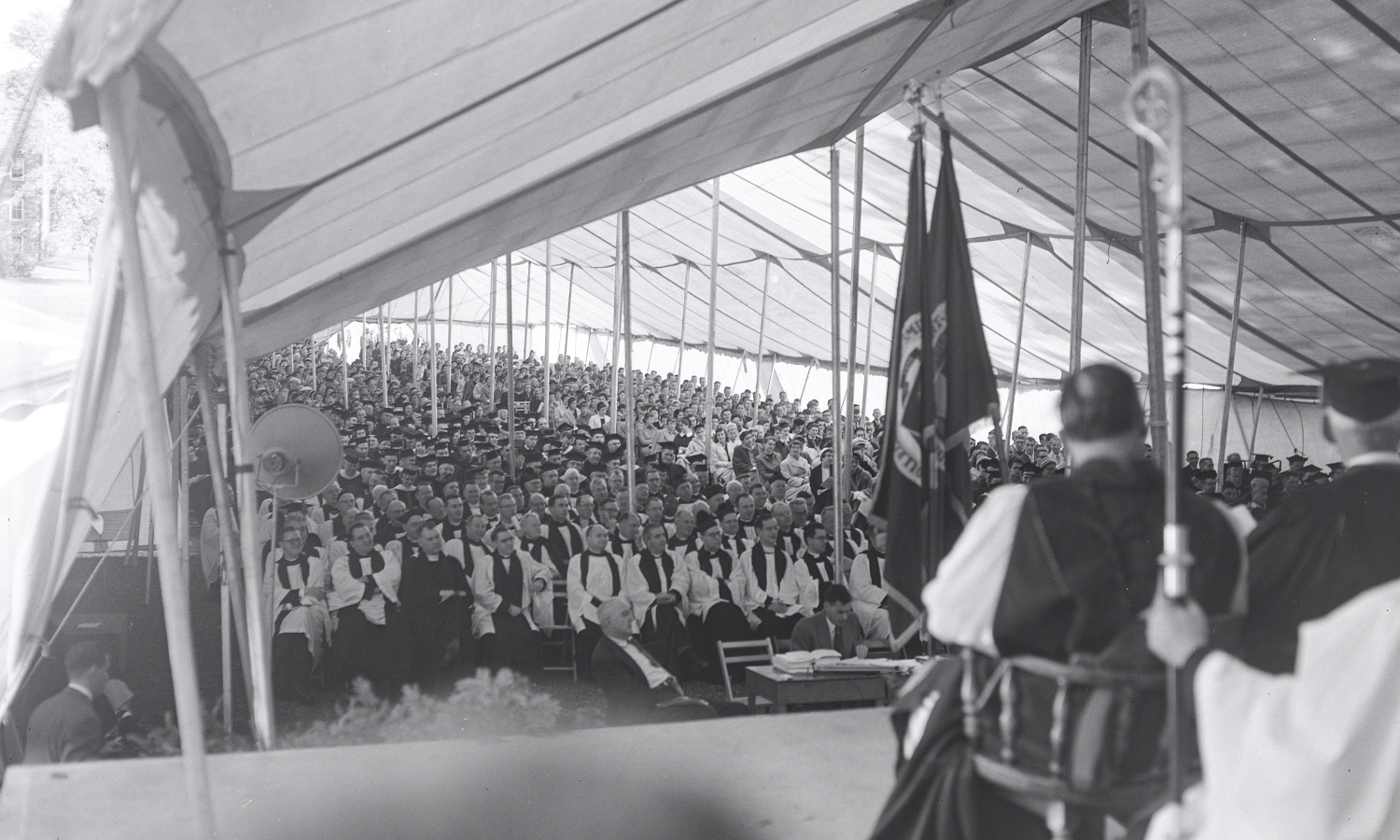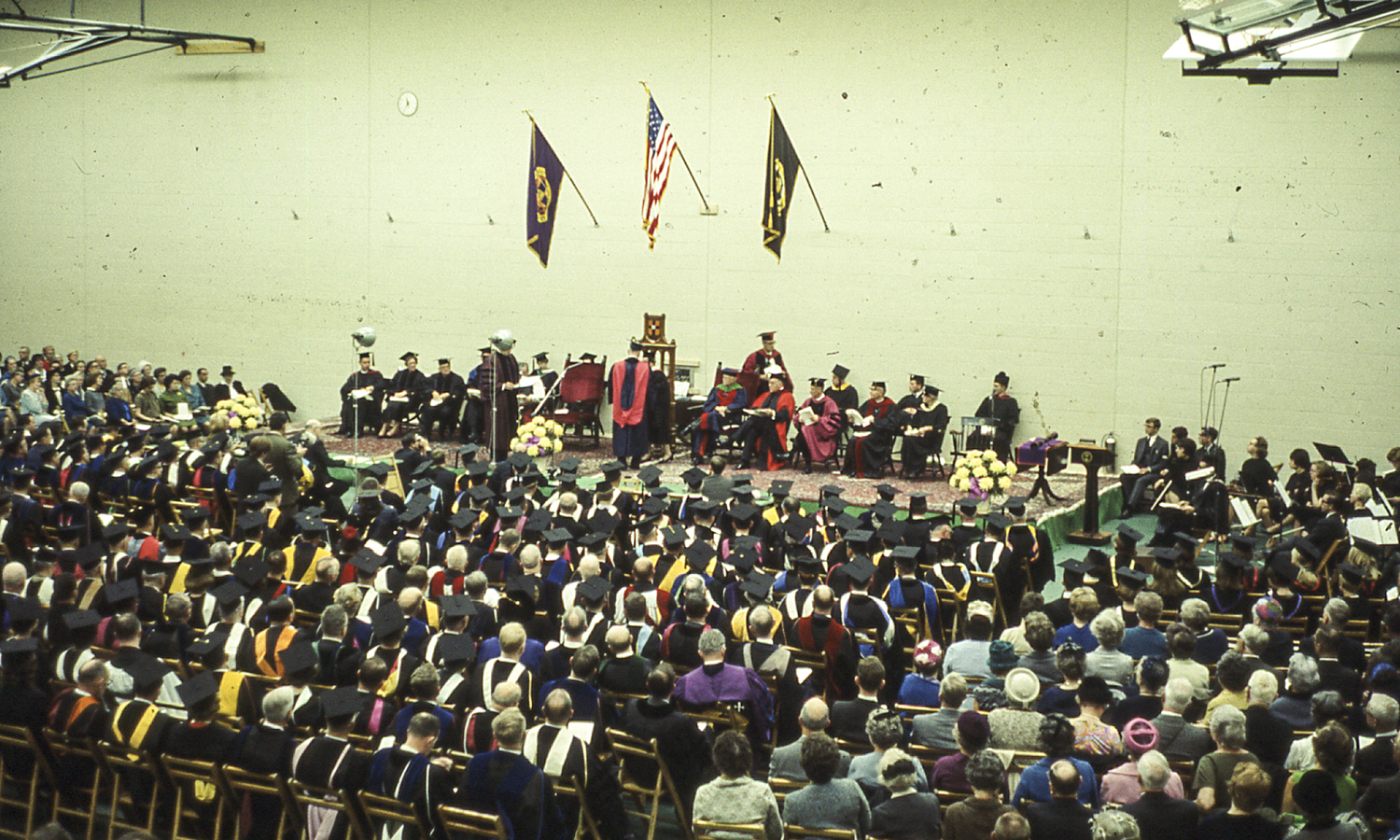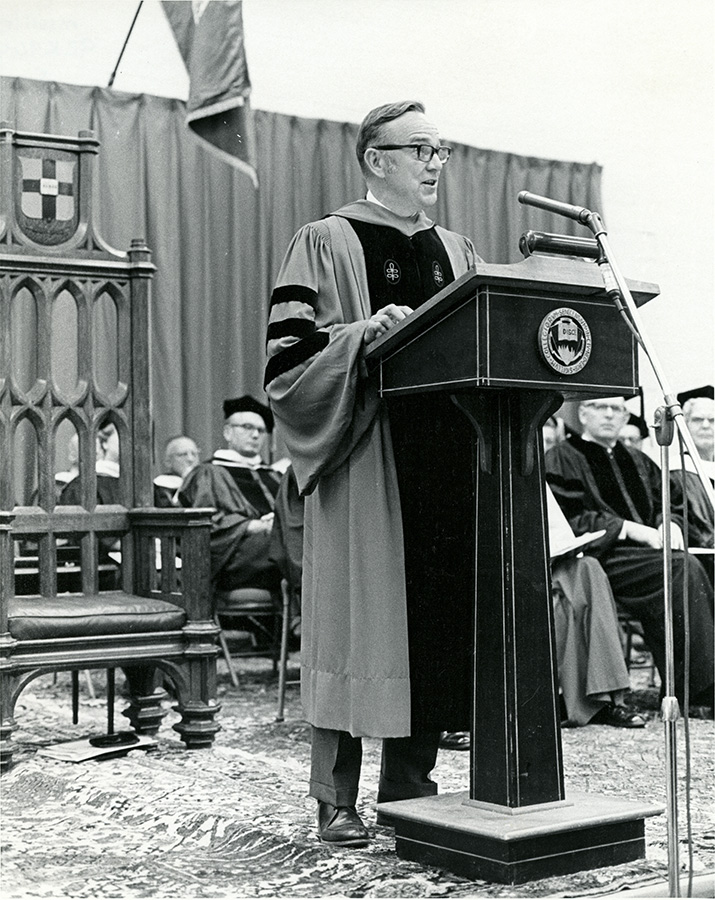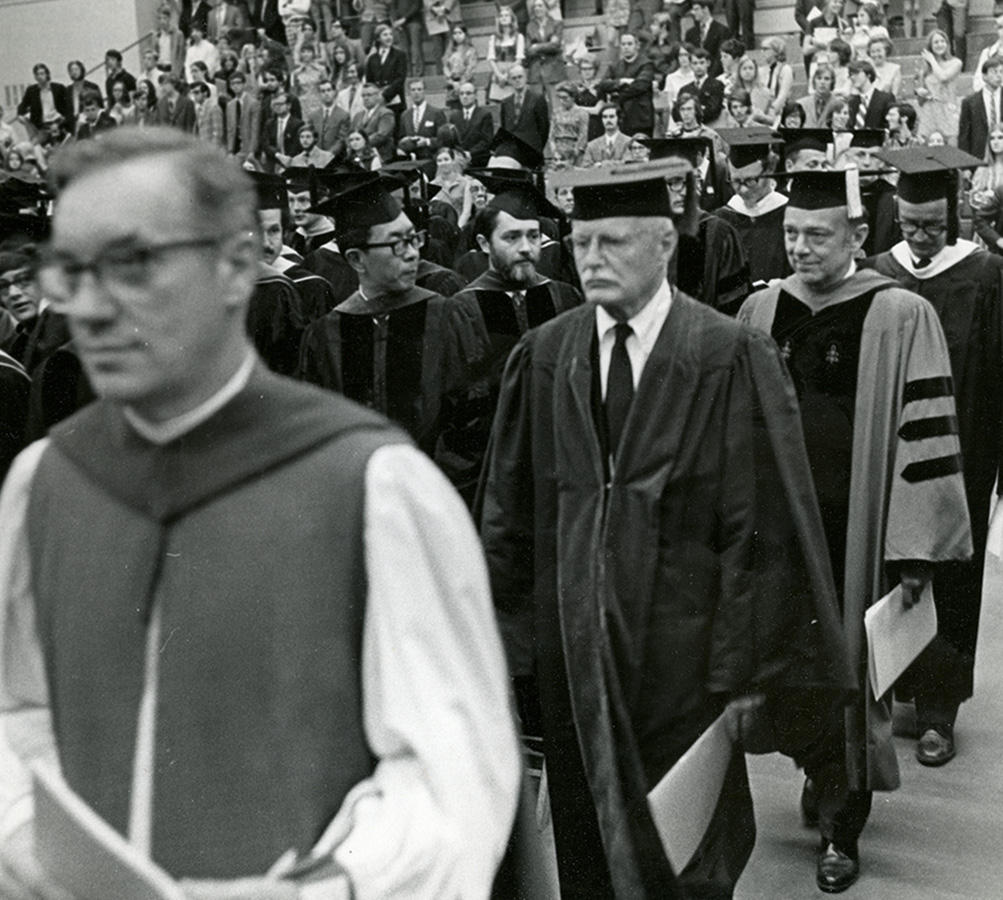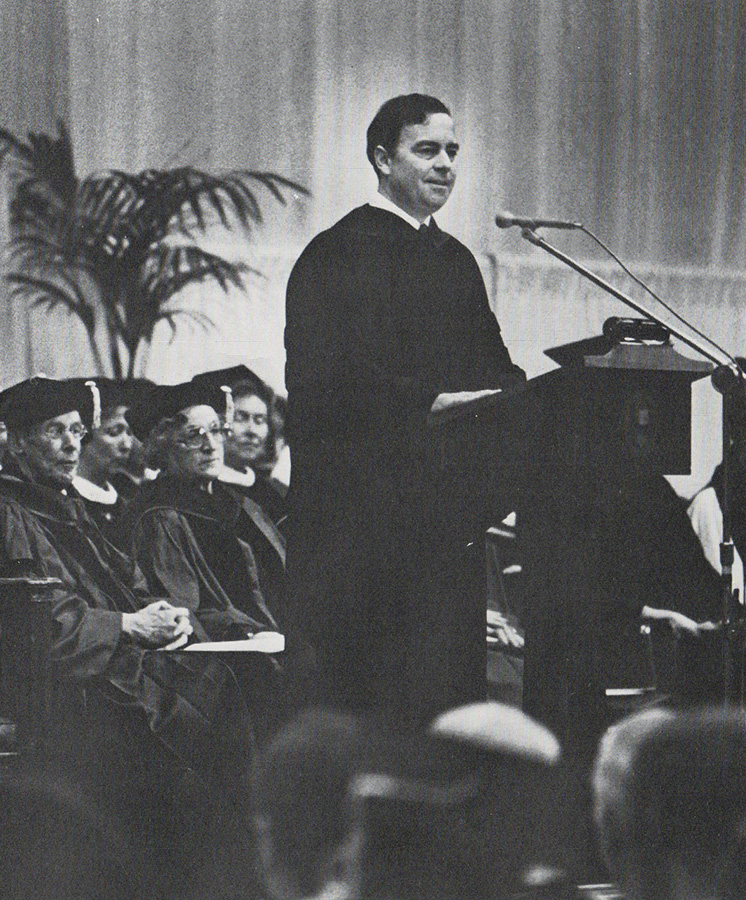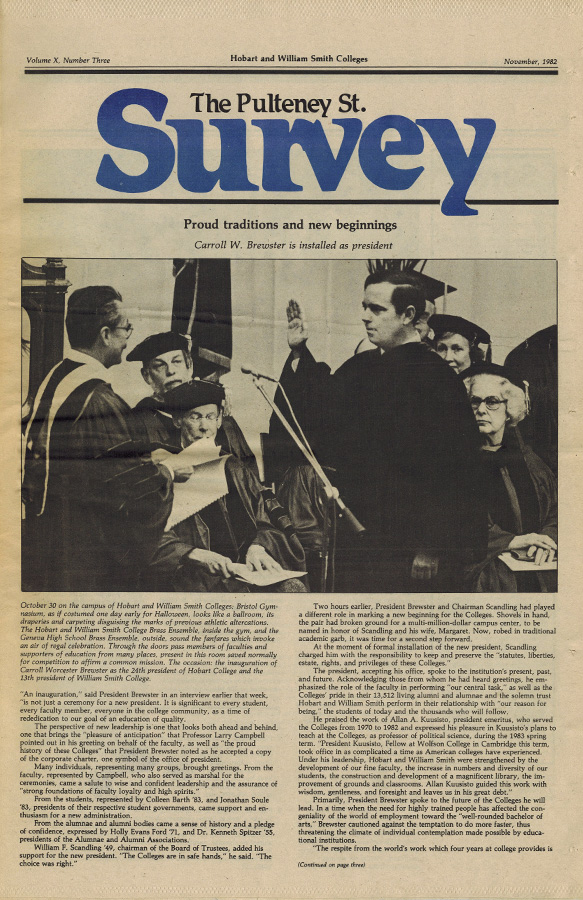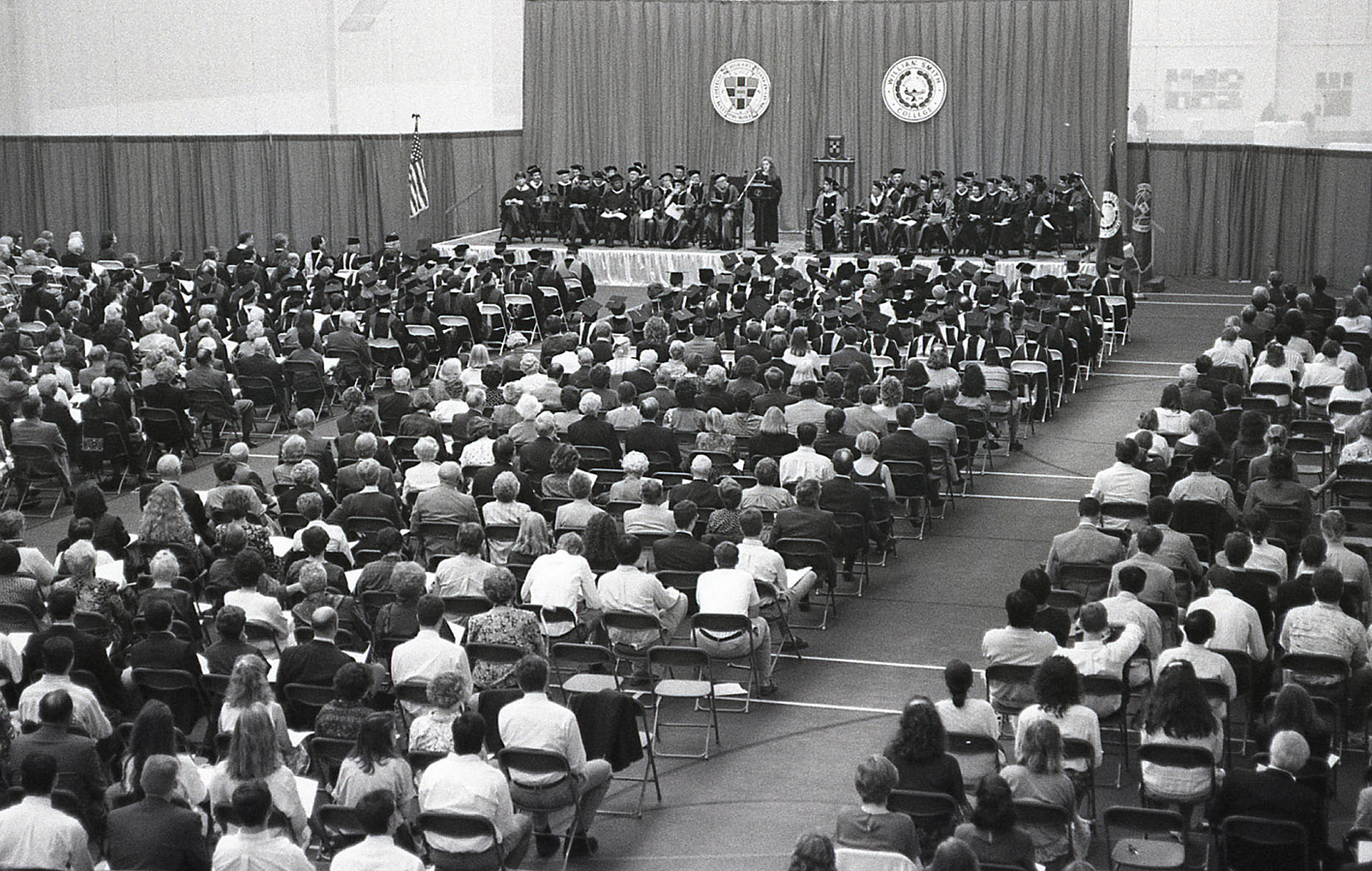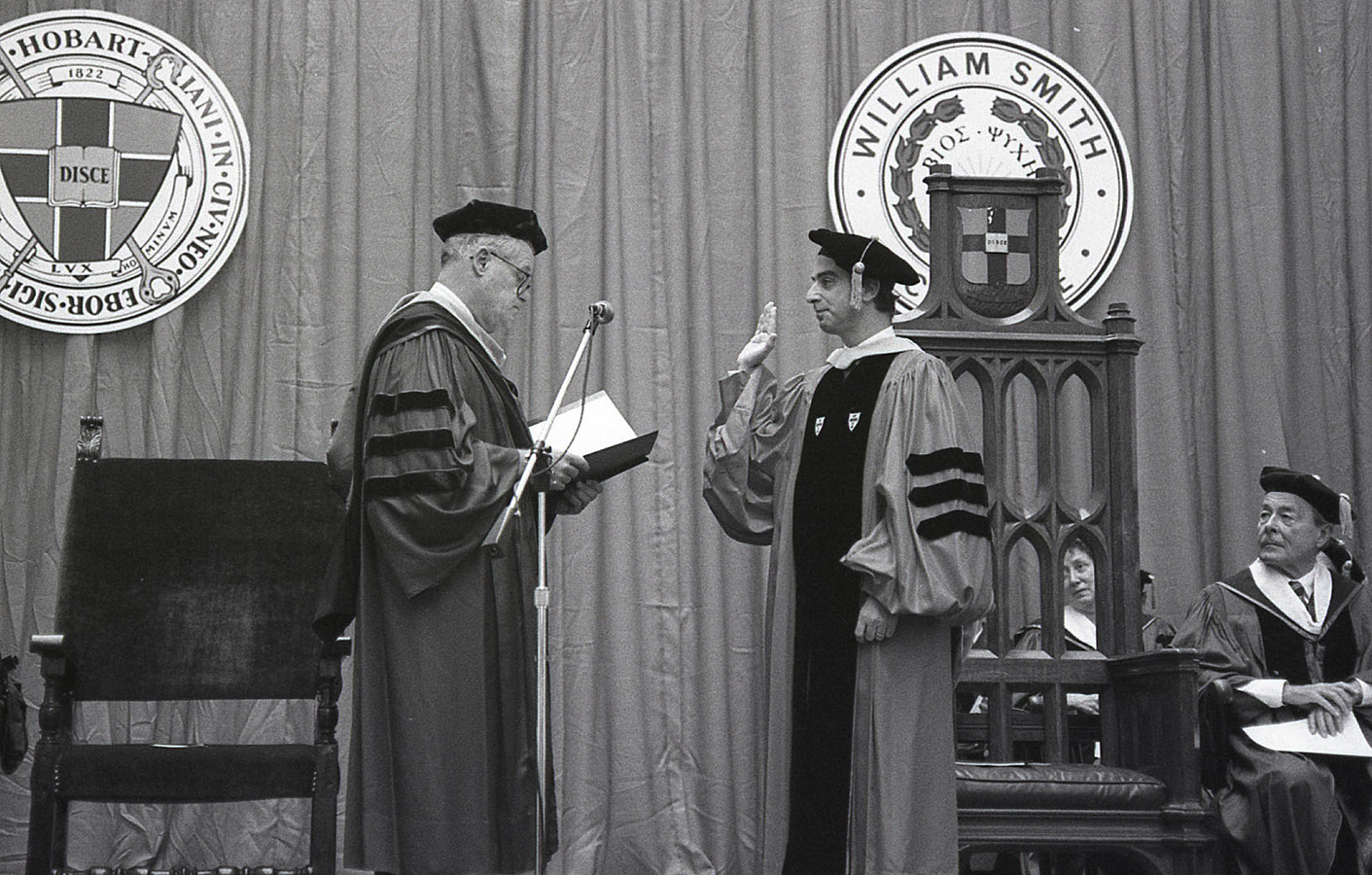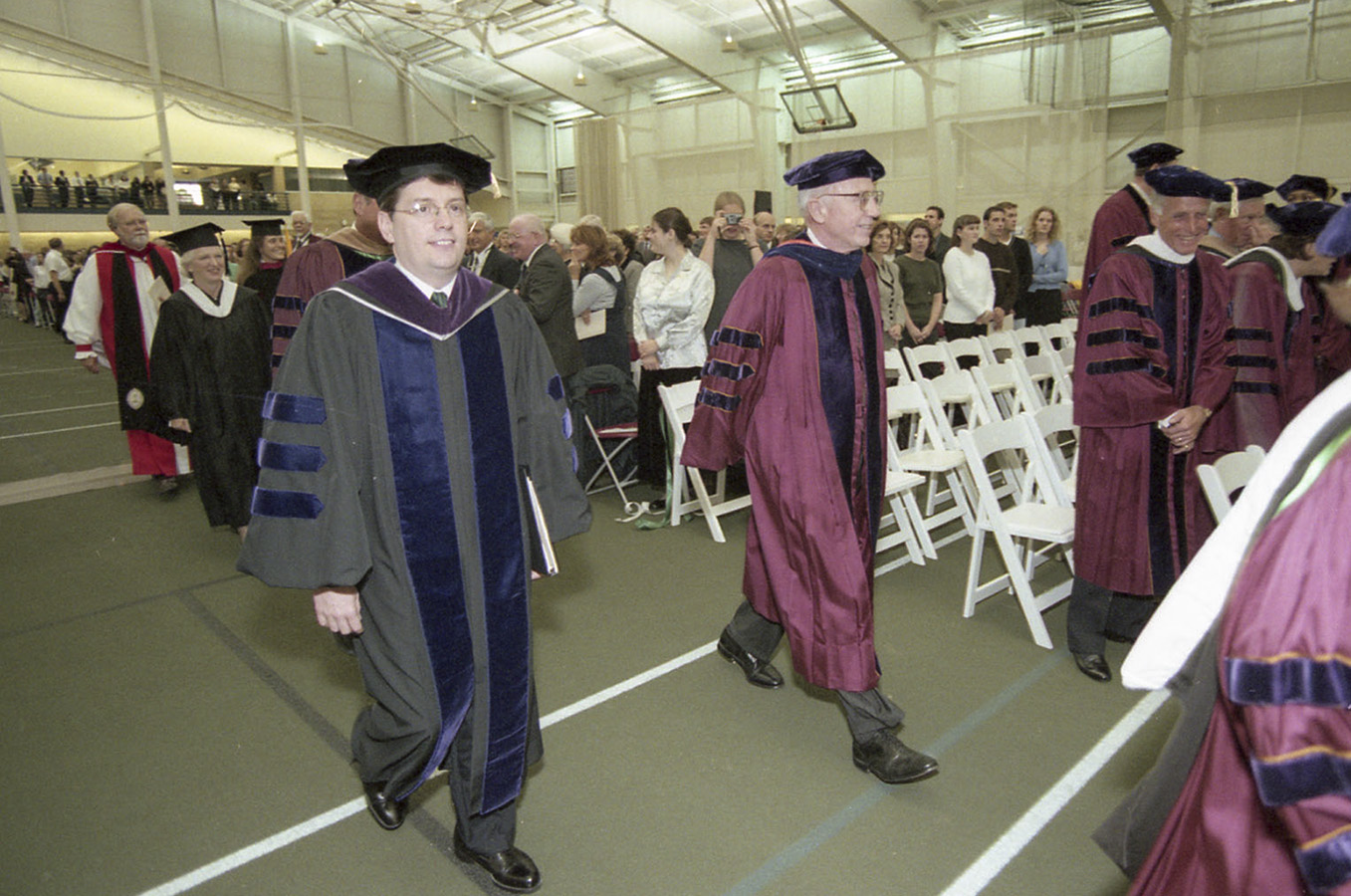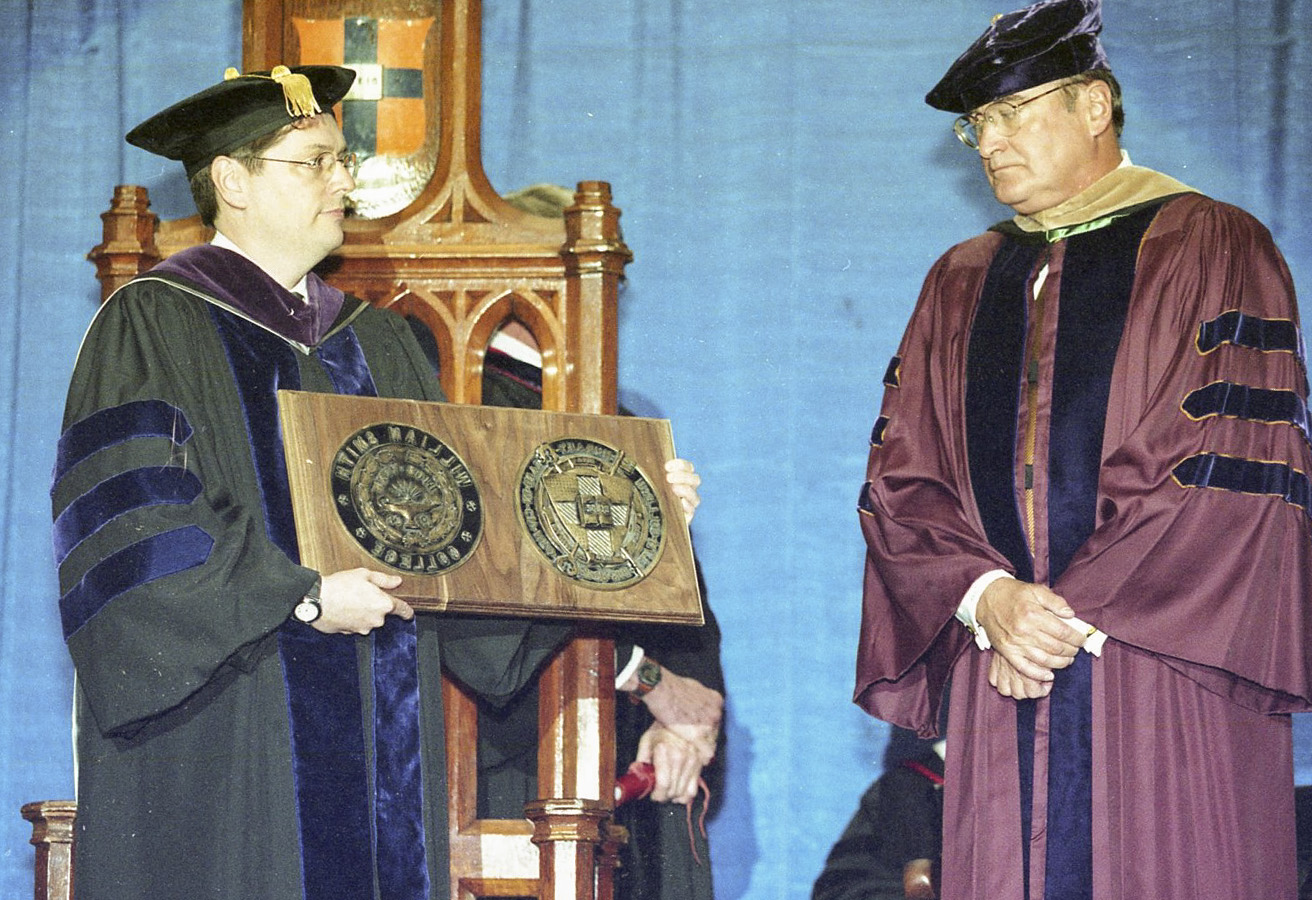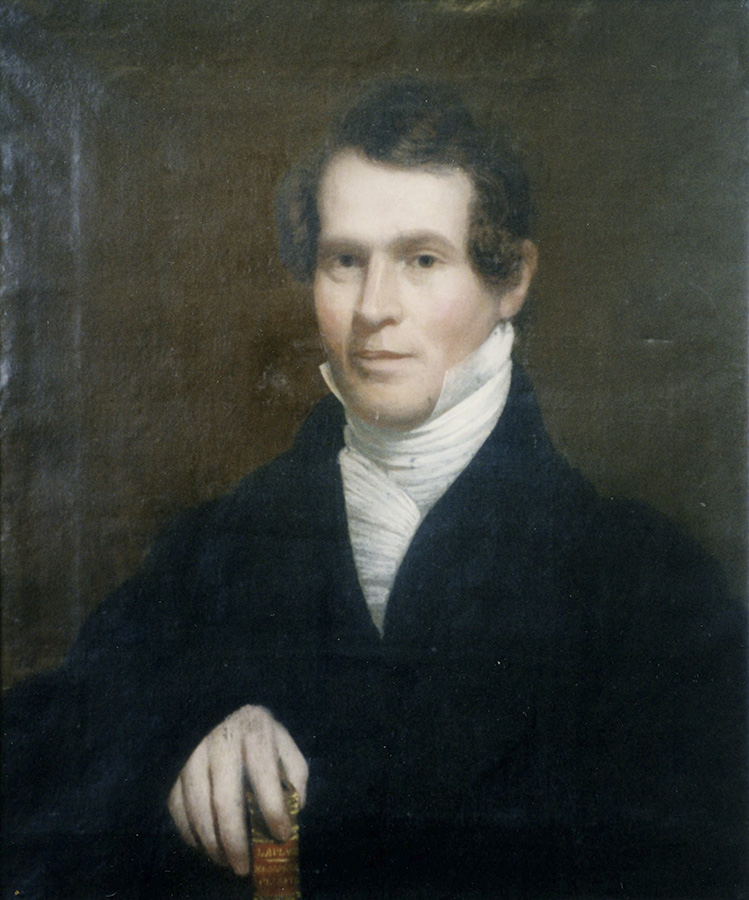
Inauguration: Words from Past Presidents
11 October 2019 Inauguration: Words from Past Presidents
One hundred years ago, on June 23, 1919, the Hobart and William Smith community gathered at Commencement to celebrate the inauguration of The Rev. Murray Bartlett L.H.D. 37. In his speech, Bartlett described the inauguration of a president as a meeting place of the old and the new a new chapter of an old story.
As the Colleges prepare for the inauguration of Joyce P. Jacobsen, the first woman to lead Hobart and William Smith, we take a look back at the words of inaugural inspiration, warning and wisdom from 10 past presidents. Their speeches not only reflect their optimism and vision, but also demonstrate that the challenges higher education is experiencing today have been with us before and have been overcome, again and again.
***
The Rev. Jasper Adams (1826-1828) was elected president of what was then Geneva College in 1826. His inauguration took place at Trinity Church on Aug. 1, 1827. In a lengthy and detailed address, he discussed the essential parts of an accomplished education:ancient literature, mathematics, skill in both constructing arguments and in detecting sophistical reasoning, religion, science, government and physical education.
Adams believed this foundation was critical for future leaders of our nation. He addressed the students directly: Your intellectual and moral habits are here in a great measure to be formed. The present period is to you the spring of life, and if you now bestow labour and diligence on your mental culture, you cannot fail to reap a plentiful harvest.
***
The third president of Geneva College, The Rev. Benjamin Hale (1836-1858) delivered his inaugural address in the chapel on Dec. 21, 1836. He spoke of how the proliferation of colleges in the young United States already numbering around 80 was of benefit to all citizens. The attainments of a man of real learning and well-balanced mind, who mixes freely with the world, cannot fail to be valuable to the community in which he lives, he said.
He went on to discuss how college offered equal ground to all, regardless of financial or social background. no where, even in our free country, I will venture to affirm, do rich and poor meet together on terms so perfectly equal, he said. The contest is for intellectual rank, and it is on equal terms. Hale believed that equitable educational accessibility was critical for the continued success of the nation, as he explained: Shall the rich gain the power, because they are able and others not, to command the means of intellectual cultivation? Such would be the result, if we had not institutions of the highest class, under such arrangements, as to be accessible to all.
***
The inauguration of The Rev. Langdon C. Stewardson LL.D. 1913 (1902-1912), who would become the first president of both Hobart and William Smith Colleges, took place at Commencement, on June 23, 1903. His address, titled The World and the Ideal in the Academic Education of Man, focused on what he described as the centre of sensation and the centre of thought. Man is not only the possessor of a mind, but also an inhabitant of the world, he said. He must not only know himself, but also his world. He went on to argue that all educational systems must therefore provide for the demands of the world as well as for the needs of the spirit and to give not merely training for the mind but preparation for life.
Stewardson described the demand of the world as the demand that education shall have outlook; that it shall be such as will fit young men for the actual business of life, that education shall be directed towards some immediately useful end, that it shall be utilitarian, practical. Equally important was the demand of the ideal or spirit. He argued that students be brought to know themselves and the inestimable worth of character and mind, for it is the spiritual aspect of education [] that brings mans intellectual and moral nature into view and takes account of its ideal interests.
***
The Rev. Lyman P. Powell (1913-1918) was installed as president at the Smith Opera House on Nov. 14, 1913. In his speech, he defined The True College: It will try to build up character as well as scholarship, he said. Men and women will go out from its halls stronger, better, finer and more useful for tarrying an impressionable while beneath the covert of its love and reverence.
Powell discussed the necessary components of a cultural college education including Greek, Latin, mathematics, science, literature, philosophy, history and economics before turning his attention to athletics, because, as he said, play as well as work has place in any plan for culture. He explained: When at play a man is often most self-revealing. To call a man a good sportsman is to allow to him the qualities of pluck, persistence, fair play, self-restraint; and whatever can produce these qualities is in essence cultural, no matter what temptations may surround it.
***
Powells immediate successor, The Rev. Murray Bartlett L.H.D. 37 (1919-1936), was inaugurated at the Smith Opera House on June 23, 1919. His speech, The Function of the College To-Day, frequently referenced the Great War. After a great world-convulsion, he said, in which the very foundations of the structure of the worlds social framework have been shaken, a struggle in which we were forced to take a decisive part, America finds her time-honored traditions facing new and utterly different responsibilities, her well-knit social and industrial life threatened with new dangers.
He used this framework to discuss how citizenship and its driving forces, discipline and morale was not only the primary and essential function of college, but critical to the survival of civilization. He said: The great function, then, of the college, at this critical period of our national history, is to be, first, a place where [discipline and morale] rule and direct the life of the community a microcosm, as it were, of what the national life should be. In the second place the college should be a school where the action of these forces may be studied with regard to their further application and development in the national life.
***
William A. Eddy Litt.D. 47 (1936-1942) delivered his inaugural address on Oct. 2, 1936, during which he announced the creation of a required course of study on citizenship. The theory that a liberal education will automatically make a citizen responsible is attractive, he said, but untrue. He went on to say: We arouse interest in science, not on the football field, but in the laboratory and we may now attempt the same direct approach to social responsibility.
Eddy illuminated a need for enlightened leadership in public life as a driving force behind the creation of the citizenship coursework. The emergencies faced by mankind, from age to age, have appeared in diverse forms, he said, and education has met them, according to the times, with emphasis upon logic, theology, classical studies, or natural science. He then argued that the time has come for another step forward. The contemporary crisis in democracy, upon which our civilization hangs, demands civic leaders of intelligence and integrity.
***
Another president whose tenure was informed and affected by global war, Dr. John Milton Potter (1942-1947) was inaugurated on Oct. 3, 1942, at Trinity Church. We are young men and women of this war, of this time of revolution, he said. We are the generation of the bridge of the bridge between the two great wars, and even more the bridge into the future that lies beyond this greatest of wars.
In such a time of upheaval and uncertainty, he addressed the idea of doubt. This is a generation of doubt, he said. We doubt the values of things tangible and intangible. We doubt the motives of men. We doubt the efficacy of much that our grandfathers found efficacious. We doubt the ability of most men to find an efficacy any more real. Occasionally, though less frequently and less intensely, we doubt ourselves. Still, Potter offered hope: The purpose of education is not escape from doubt. It is to learn how to meet doubt head on, and again and again to grapple with it; to move through it to further conflicts with further doubts.
***
When Allan Kuusisto P78, P81, L.H.D. 82 (1970-1982) was inaugurated in Bristol Gym during Homecoming weekend on Oct. 9, 1970, he spoke about the benefits of a liberal arts education. The specialist is still needed (perhaps more than ever as our dependence on technology grows), but the broadly-educated, deeply socially conscious, thoughtful, philosophical human being is even more in demand if we are to make a go of it in the years ahead, he said.
He also spoke about the need for continual renewal. The higher education community generally is faced with the need to renew itself so that it will be a useful, social institution in a period of accelerating change, he said, challenging the Colleges to strike a blow for a return to quality, to a preparation for enlightened life in the decades ahead, for active participation in the efforts to solve the problems of war, poverty, racism, environmental spoliation. He believed the Colleges must help provide their students a sense of proportion, a perspective which will permit them to adapt to a succession of changes and problems which we can scarcely anticipate today and to take the lead in finding answers.
***
Growth and change were also on the mind of Carroll W. Brewster L.H.D. 91 (1982-1991) on the occasion of his inauguration in Bristol Gym on Oct. 30, 1982. These Colleges are no strangers to tough times, he said. It is never good enough to say that we shall thrive in the future because we have in the past; let us use times like this to identify elements we have stood for in the past on which our future can be built.
Brewster spoke about the social and technological complexities of tomorrow, cautioning that we must work together now to resist the temptation to do more and more faster and faster. He argued that college should offer a respite from the worlds work, which would allow students to develop habits of contemplation and the time and quiet enough to begin to cope with the depths of evil, pain, and death; to view the heights of all that is goodness; and to begin to strike the careful balance between ambition and altruism, self-interest and selflessness, on which a useful life is based.
***
When Richard H. Hersh L.H.D. 99 (1991-1999) stood before the inaugural crowd in Bristol Gym on Oct. 27, 1991, he spoke about how a liberal arts education aids in the critical formation of identity, voice and self-knowledge. My guess is that any of us who reflect on how we got here today will find the voices of others a powerful influence in the shaping of their identity, he said. It is this transformation process from what one is to what one can be the discovery and assertion of ones own voice that I see as the primary purpose of a liberal education in this modern world.
The Colleges have a solemn obligation to mediate the conflicts that inescapably arise between men and women and to show how the differences they may sometimes experience as threatening or negative are, in the end, empowering, he said. Such conflict is empowering because understanding of the other requires that we be able to take each others perspective, which in turn leads to self-knowledge, and self-knowledge allows ultimately for true learning to take place. When we know each other and ourselves, we discover our common humanity.
***
On Oct. 22, 1999, Mark D. Gearan L.H.D. 17 (1999-2017) took to the podium at Bristol Gym to begin what would become the longest presidency in HWS history. His inauguration remarks reflected on our proud history, from the Civil War to Western Civ, before challenging listeners to ask, How do we honor the past build upon it and leave this remarkable place a better place?
He also used his address to look toward the future. Fifty years from now a future HWS President will be preparing for his or her inaugural address and what will be said of our time? Did we honor the past and build upon it? Were we bold? Did we work in community with trust in each others good faith even while we were disagreeing? Did we seize the opportunities of our real momentum, quality students, financial stability, academic reputation and tremendous alumni/ae support?
***
For more information about President Jacobsens inauguration, visit https://www.hws.edu/president/inauguration/.
The inaugural addresses referenced in this article were collected from the Hobart and William Smith Archives & Special Collections, The Hobart Herald, The Herald and the Colleges website.

